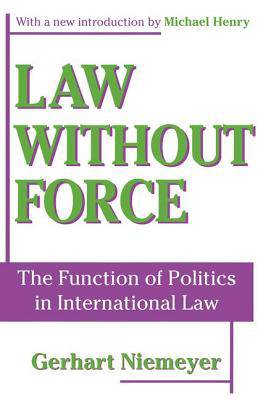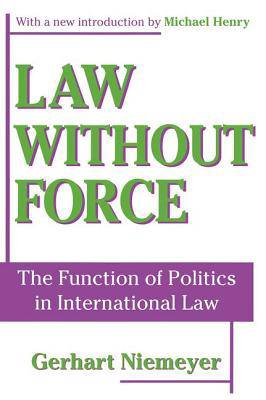
- Retrait gratuit dans votre magasin Club
- 7.000.000 titres dans notre catalogue
- Payer en toute sécurité
- Toujours un magasin près de chez vous
- Retrait gratuit dans votre magasin Club
- 7.000.0000 titres dans notre catalogue
- Payer en toute sécurité
- Toujours un magasin près de chez vous
62,45 €
+ 124 points
Format
Description
Law Without Force is a landmark in political and social philosophy. It proposes nothing less than a completely new basis for international law. As relevant today as when it was first published nearly sixty years ago, it commands the attention of all concerned with what the future may bring to the law of nations. The great scope of Niemeyer's undertaking draws respect even from those who disagree with his challenging analysis of the historical past and his suggestions for the future of international law. In his new introduction, Michael Henry observes that Law Without Force provides us with a foundation of Niemeyer's thinking. Published in 1941, when Hitler was swallowing up Europe, this volume shows how a first-rate mind grappled with a legal, historical, social, and ultimately metaphysical problem. It provides in detail the reasoning behind Niemeyer's rejection of a foreign policy based on morality and his distinction between authoritarian and totalitarian governments; and it provides us with the first stage of his lengthy and prodigious effort to understand "this terrible century." It is a book that no serious student of Niemeyer can afford to ignore. At the very heart of the author's vigorous discussion may be found his rejection of a moral basis for international law and his suggestion that a functional basis should be substituted for it. The book incisively reviews the relation between traditional international law and the changing structure of international politics concluding that the traditional system of law has operated as an agency of disharmony and conflict. After an investigation of the traditional legal system, the author then asks, "What type of law fits the social structure of this modern world?" The answers are presented in the last part of the book, as Neimeyer offers his case for a functional system of law, divorced from moral exhortations or appeals to shattered authority. Philosophy, sociology, and legal theory are brilliantly interwoven in this volume, which will engage serious readers interested in political and social theory.
Spécifications
Parties prenantes
- Auteur(s) :
- Editeur:
Contenu
- Nombre de pages :
- 436
- Langue:
- Anglais
- Collection :
Caractéristiques
- EAN:
- 9780765806406
- Date de parution :
- 30-11-01
- Format:
- Livre broché
- Format numérique:
- Trade paperback (VS)
- Dimensions :
- 152 mm x 224 mm
- Poids :
- 603 g

Les avis
Nous publions uniquement les avis qui respectent les conditions requises. Consultez nos conditions pour les avis.






